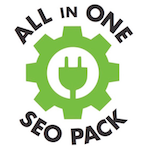There are lots of companies who build software that competes with either in part or in whole against WordPress websites. I remember websites being a part of our World Wide Web since the 90’s. Then there were chat rooms, forums, and blogs. Now we have all kinds of different web-based software from social media to marketing applications and shopping platforms. This morning I realized that even though I have personally recommended that a small local business only needs a Facebook page, Facebook does not have all the components of a WordPress website. This thought leads me think about what other platforms are doing doing the same? All these other platforms and applications are trying to replace the use of a website or part of a website.
#1 Social Platforms
Social Platforms are not websites. Though you can definitely acquire and build new relationships much easier on a social network than a website there are missing components. Social platforms typically are discussion based and do not have much room for explanation of services. They sometimes have forms or call to actions but at this stage in your new relationship with someone would you say they are a qualified customer? Social platforms have hash tags that take conversations away from you, though this is great for cross reference by design but this does not necessarily lead them back to your business or service.
Social platforms are missing the level of professionalism and features that connects quality customers to your services and products. WordPress website have the features to keep and organize all your content. In addition, WordPress websites allow you to cross-reference your own content, navigate it and engage into conversation. Taking it one step further, you can monetize your own content or present an offer however you like to build a list.
#2 Lead Capture Platforms
Lead capture platforms are mostly just landing pages that enable a customer to opt-in. All web pages are landing pages. Think about it. If you google something or follow a link from social media and you end up on a web page then you have landed on a web page that can capture your information. The difference between a regular web page and a landing page is the offer and form. The components of a landing page are simple: the offer, list of benefits and a form. On the back end, especially easy with WordPress, a form can integrate with multiple services like an email list, customer relationship management (CRM) software and more.
Some platforms that provide landing page capability are trying to replace one type of web page, landing pages. If you are a large company conducting a marketing campaign and you are concerned about the extra traffic to your website then you may consider one of these services. The questions are: Does this really benefit your business? Are you duplicating your efforts by building landing pages on a separate platform? Can your website handle the extra traffic from your marketing campaign? These and many more questions will have to be answered.
I can image if the landing pages were built on your website then you are playing the long term game, meaning that you will eventually replace any paid search advertising with organic, increase your website search engine results and thus your website ranking. Perhaps you will have to scale up your website server or infrastructure but that cost could be much less than outsourcing.
WordPress is a very easy and simple way to build landing pages. With the right framework and some integration you can make beautiful landing pages that will integrate quickly. There maybe no need for replacing or sharing with another platform.
#3 Shopping Sites
There are many e-commerce only website platforms that are making a run at building websites specifically for selling products. What I find interesting is that these website are integrating back into websites and social media? Could it be that an e-commerce specific platform just does not have the same influence on the marketing place as a real website? E-bay has been wildly successful with selling products but at what cost? What is the 5 year expense report look like to run your business on an e-commerce only platform?
Consider that you are a book author and selling books. The most effective way to go to market is to leverage social media and print on demand. However, at some point, if it is a really good book, you will make your money selling your book from your website and paying for off-set printing. So, again shopping platforms seem to be great and maybe you can even run a business with one but you will not fully optimize your profits using a platform that is replicating a function of WordPress website.
#4 Mobile Apps
Mobile applications are awesome. However, when it comes to your business, some of them are just websites that have been cloned or copied into a different code base. Let’s consider middle to large businesses with legacy coded websites. The economical choice would be appear to be cloning your website into a mobile app. The problem here is that this duplicates your website, making updates and maintenance twice as expensive. The short-term gain in this case is a huge on-going maintenance expense.
WordPress websites are very easily mobile friendly. Having a single code base to manage your content for both the web and mobile devices is the way to keep your expenses low. The added benefits of mobile friendly websites are lead capture, image galleries and menus making WordPress websites a great solution for mobile devices.
Another scenario even for WordPress is “mobile compatibility” which could apply to any size business. Being mobile compatible is not the same as having a WordPress website that is truly responsive/mobile friendly. Mobile compatibility versions of your website strips out branding and marketing features. I do recommend mobile compatible plugins as a quick fix but that just means that you need to fix the real problem quickly, converting your website into a WordPress theme/framework that is responsive.
#5 Listing Services
You maybe thinking “what?”. Listings services or directories are great for adding small bits of information regarding your business but they come way short when it comes to communicating the quality of your services and what you do. Directories like many of the other services mentioned here are keened in on one thing. In this case it’s search results. Their goal is to list as many different business as possible, gain traffic, and acquire links thus building search ranking. This is great! What happens if you don’t have a website? Then all you have listed is what you do and a phone number. The key benefit for a directory is to point them to your website, building your website ranking. WordPress websites, as is out of the box, is the most SEO friendly website system available.
Taking it one step further, using professional SEO add-ons with your WordPress website will get you a lot of great results as long as it is combined with great quality content. There is no substitute or replacement this formula.
And that is why WordPress websites are the most popular.
Do you think one day we will replace the 7 digit phone system? Maybe somebody is trying to mimic or replace part of it now but I can’t image that. WordPress websites along with it’s great variety of add-ons can’t be replaced in whole or in part by other services. WordPress websites deliver the features and benefits that any business needs to be successful. More marketing platforms will continue to rise but owning your own domain name and website platform is the core of your marketing efforts and it’s here to stay.




